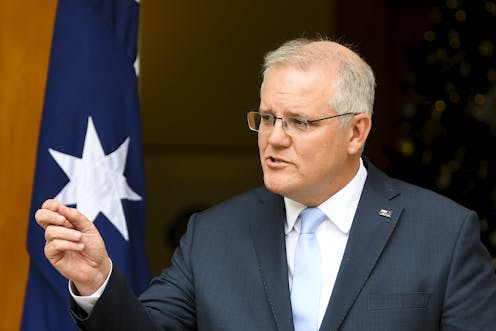aged care to cabinet, Tehan to trade in Morrison's modest reshuffle
- Written by Michelle Grattan, Professorial Fellow, University of Canberra

The most important changes in Scott Morrison’s limited reshuffle are centred on two vital and controversial issues – aged care and trade – that will severely test the government in coming months.
Aged care has been elevated to cabinet and put in the safe hands of Health Minister Greg Hunt, who has performed strongly during the pandemic.
The current Aged Care Minister, Richard Colbeck, retains responsibility for aged care services, including delivery of residential and home care packages and the regulation of the sector.
Read more: Grattan on Friday: Six issues on Scott Morrison's mind over summer
With the royal commission due to deliver its final report in February, Hunt will spearhead the policy response. Importantly, he will carry the government’s public case as it works through one of the most difficult policy challenges of early 2021.
The choice of Dan Tehan for trade is logical. He comes with an extensive background in the area before his parliamentary career, including serving in the Foreign Affairs and Trade Department, and as an adviser to a former trade minister, Mark Vaile.
Tehan arrives in the portfolio – shed by Simon Birmingham who is now Finance Minister – when trade tensions with China are an all-time high, and Australia is looking to negotiate trade agreements with Europe and the United Kingdom.
Tehan’s education portfolio goes to Alan Tudge, who will also have responsibility for youth (previously under Colbeck). The recent Four Corners expose about Tudge’s private life hasn’t affected his ministerial career. Questioned at his news conference on Friday, Morrison said those matter related to years ago.
Morrison has also elevated some spear carriers of the right.
Queensland senator Amanda Stoker is promoted from the backbench to become Assistant Minister to the Attorney-General. ACT senator Zed Seselja moves from being an Assistant Minister to become Minister for International Development and the Pacific.
Rewarding the Liberal party right might be politically useful next year, if Morrison needs the conservatives’ forbearance for a shift on climate policy.
Andrew Hastie is also from the Liberals’ conservative wing, but his move up from the backbench will be seen through a foreign policy prism.
He has been an outspoken hawk on China and the Chinese will be particularly noting his appointment as Assistant Minister for Defence.
Hastie has been well respected on both sides of politics as chair of parliament’s influential intelligence and security committee.
A former soldier in the SAS who served in Afghanistan, he will potentially be able to help manage the fallout from the Brereton report on alleged Australian war crimes, which is proving difficult for the government.
The new Immigration Minister will be Alex Hawke, Morrison’s strong factional ally. This position has been in limbo for a year, in the hands of an acting minister, while David Coleman has been on personal leave.
Coleman is to become Assistant Minister to the Prime Minister for Mental Health and Suicide Prevention, an area Morrison has given high priority in the pandemic.
It is notable Ben Morton, who is very close to Morrison, has not been moved up to the junior ministry. He stays as Assistant Minister to the Prime Minister and Cabinet, where he can have a bird’s eye view on many matters, as distinct from the narrower focus demanded by a ministerial portfolio.
Morton formally takes over from Hunt to become Assistant Minister for the Public Service — a role he has had anyway while Hunt has been preoccupied with the health crisis. A former Liberal party director in Western Australia, Morton will also have the politically-sensitive position of Assistant Minister for Electoral Matters.
Read more: Grattan on Friday: China plays reverse 'poke the bear'
Jane Hume moves up from assistant minister, with expanded responsibilities as Minister for Superannuation, Financial Services and the Digital Economy.
Communications Minister Paul Fletcher adds urban infrastructure and cities to his responsibilities, but loses cyber safety.
Morrison emphasised key portfolios relating to the economy and security remained unchanged, as did the positions held by the Nationals, and the number of women in cabinet.
He said the changes reflected a “very strong focus on stability in key portfolios, together with a commitment to bring forward some new talent”.
The new Morrison ministry list can be found here.
Authors: Michelle Grattan, Professorial Fellow, University of Canberra





